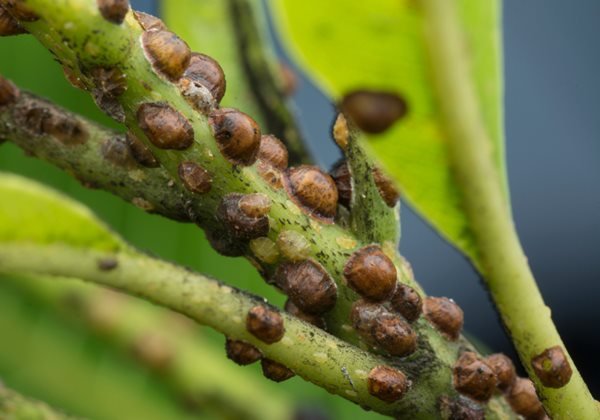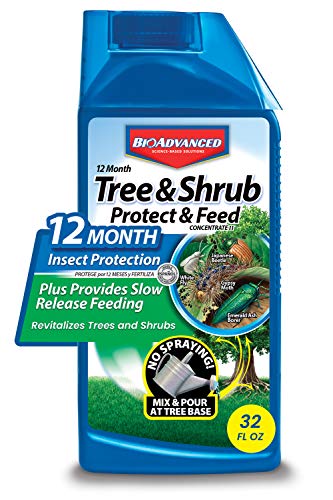Insecticide For Scale
Scale insects are one of the more common groups of insects that attack plants. You may find them feeding on trees, shrubs and even on indoor plants.
When they first hatch out of their eggs, scale insects are mobile. At this stage, they are called crawlers, and they are very tiny. Most gardeners never notice these crawlers.
Once they settle down to feed and pierce the plant’s tissue with their needle-like mouthparts, they never move again and become firmly attached to a leaf or stem. Scales also cover themselves with waxy material that protects and hides them. Many gardeners don’t recognize there is a problem until the plant is heavily infested and damage has occurred.
Scale insects come in many types, but here are a few of the most common. Tea scale insects are about the size of a hyphen, appear slightly fuzzy and are white or brown. They are a major pest of camellias and some hollies. Florida wax scales look like waxy, white domes about the size of a nail head and occur on a wide variety of plants. Euonymus scale, on the other hand, attacks euonymus and resembles tea scale. On magnolia trees, false oleander scale looks like small white bumps on the leaves, and magnolia scale appears as yellow waxy blobs about one-quarter to one-half inch across on the branches. Soft brown scale occurs on ficus, scheffleras and other indoor plants. Fern scale appears as white dashes on the fronds. There are many others.
As scale insects feed on the sugary sap of a plant, they excrete some of the sugar as a liquid called honeydew. The honeydew accumulates on the foliage and can cause it to look shiny and feel sticky.
This rich food source does not go unnoticed. Ants, wasps and other insects may be attracted to the sweet honeydew. Even more common is the growth of fungal organisms that produce an unattractive black coating on the leaves called sooty mold. These fungi feed on the honeydew and do not attack or directly damage the plant, but the appearance of sooty mold is often the gardener’s first noticeable sign of trouble.
Be aware that other sucking insects, such as whitefly and aphids, also produce honeydew that can lead to sooty mold. And sooty mold does not occur with some scales, such as tea scale.
Scales spread from plant to plant as tiny crawlers that have legs and can move around. Crawlers can be controlled with contact insecticides such as insecticidal soap or malathion, but most gardeners never notice them and miss the opportunity. Many scales produce crawlers in the spring. Once the crawlers have settled down to feed, they create their protective covering and contact insecticides are largely ineffective.
The safest effective way to control scale is with a horticultural oil spray. These insecticides contain oil in a form that will mix with water. When mixed and sprayed onto an infested plant, the oil coats the scale insects and clogs their breathing pores. The insects are suffocated rather than being killed by a toxic material. Brand names of spray oils include Volck (use only during cool weather), All Seasons and Year-Round.
For proper control, it is critical to apply the oil spray over every surface of the plant. If the insects are on the underside of the leaves and the oil is only applied to the upper surface, it will have no effect on them. Because scale insects are difficult to kill, one or two follow-up applications should be made after the first one. Follow label directions carefully.
Oils are also effective against aphids, whiteflies, spider mites and the crawler stage of scales, yet they are less harmful than other insecticides to beneficial predatory insects.
Oil sprays are best used when the temperature is between 45 and 85 degrees, and they should only be applied to plants that are not in stress. That’s one reason that the mild weather of spring is an excellent time to use them. Light, paraffinic oil, such as Year-Round spray oil and All Seasons spray oil, however, can be used during the summer.
An added benefit of oil sprays is that they also help clean the unsightly sooty mold from the plant. The sooty mold will not quickly disappear when the scale has been controlled, but as the food supply is exhausted the sooty mold will eventually weather off. Oil sprays help speed the process.
Systemic insecticides are another option for controlling scale. These insecticides are sprayed onto the plant or applied to its roots. The plant absorbs the insecticide into its tissue, and it gets into the plant’s circulatory system and into the sap. When the scale feed on the sap, they ingest the toxic insecticide and are killed.
Acephate, imidacloprid and dinotefuran are three commonly used systemic insecticides that are effective against scale. Treatment involves pouring the mixed insecticide at the base of the plant. Systemic insecticides provide an option for control when temperatures limit the use of an oil spray or when drenching around the base of the plant is more practical. Always read and follow label directions carefully when using any pesticide.
Insecticide For Scale
Scale is a common problem in households, and the only way to get rid of it is by using an insecticide. The most effective insecticides are those that contain pyrethrins, which are derived from chrysanthemum flowers.
Pyrethrins work because they’re neurotoxins that cause the insect to lose its ability to control its muscles. This means that the insect loses control over its movements and dies soon after it’s exposed to pyrethrin-containing insecticides.
The best way to apply an insecticide for scale is by spraying it directly on your infested areas. You should avoid using any type of soap or detergent before applying the pesticide, because this can make it less effective or even cause it not work at all!
List Of Insecticide For Scale
- Insect Killer – this pest control is great for use on aphids, leaf miners, leafhoppers, trips, spider mites, scales, whiteflies, mealybugs and many more. It gives poor control for caterpillars & worms. However, it does control eggs of all insects.
- Foliage protector – our insecticide is designed for use on a variety of trees & plants including corn, Potatoes, Apples, almonds, avocados, citrus, Peaches, pecans, blackberries, figs, pineapple and more.
- Dormant & growing season spray – this product is designed for safe use during both the dormant and growing season. Application during each season will increase the effectiveness of the product’s insect control.
- Organic gardening – our insecticide is OMRI listed and approved for organic gardening. Omri, the organic materials Review Institute, determines whether or not a product Qualifies as organic under the usda’s national organic program.
- Easy to use – this product mixes readily with water. It should be applied using a pump up or trigger sprayer. Use enough spray solution to completely penetrate the leaf canopy and cover both top and bottom of all leaves until wet without runoff.
Additional Info :
| Color | 32 oz. |
| Item Dimensions | |
| Height | 12 Inches |
| Width | 9 Inches |
| Length | 23 Inches |
| Weight | 2 Pounds |
- Product used as a sprayable or drench application on ornamentals in nursery, greenhouse and landscapes
- Best in class for control of scales
- Excellent for Woolly Adelgids on Eastern Hemlocks
- Excellent on Saga Palm Scales
- NOT FOR SALE OR USE IN STATE OF NEW YORK
Additional Info :
| Item Dimensions | |
| Height | 9.22 Inches |
| Width | 4.73 Inches |
| Length | 7.03 Inches |
| Weight | 3.36 Pounds |
- 12 MONTH PROTECTION: With just one application, kills listed insects and prevents new infestations for up to a year
- INSECT & PEST KILLER: Kills Japanese Beetles, Emerald Ash Borers, Adelgids, Leafminers, Aphids, Caterpillars, and more
- SLOW-RELEASE FERTILIZER: Plant food and fertilizer improves the health of your trees and shrubs
- SYSTEMIC PROTECTION: Protects your potted and outdoor trees and shrubs from the roots to the stem of every leaf
- RESTRICTIONS: Product intended only for non-bearing fruit and nut trees. Non-bearing fruits and nuts are plants that do not bear edible fruits and nuts for at least 12 months after application of pesticides. Not for sale in NY, CT, MD & VT.
Additional Info :
| Color | Concentrate |
| Item Dimensions | |
| Height | 10.3 Inches |
| Width | 2.7 Inches |
| Length | 4.7 Inches |
| Weight | 2.3 Pounds |
- HOUSEPLANT INSECT CONTROL – These ready-to-use granules are meant for controlling insects and pests affecting your indoor plants. Unlike other products, this is designed to protect containerized plants.
- NO ODOR – Unlike most other chemical pesticides and herbicides, this bug killer does not have an odor, so using it in your home will not stink up your furniture, clothing, or rooms.
- TREATS MANY BUGS – This product is a capable treatment for mealybug, termite, aphids, Japanese beetles, and more. Be cautious of certain bugs or animals that eat your plants. Bees and pets may be harmed if the product is ingested.
- FOR NON-EDIBLE PLANTS – This insect killer treatment is not meant for vegetable or fruit plants. This product is labeled for use on flower beds, roses, shrubs, and the like, but it is not labeled for use on any edibles.
- HOW IT WORKS – After incorporating the granules into the soil and watering them in, the pesticide is absorbed by the roots where it moves through the plants to assist in protection against the listed bugs. Protection lasts for up to 8 weeks.
Additional Info :
| Color | white |
| Item Dimensions | |
| Height | 6.3 Inches |
| Width | 2.8 Inches |
| Length | 2.8 Inches |
| Weight | 0.7 Pounds |
| Release Date | 2021-10-05T00:00:01Z |
- BUG KILLER – This pest control is great for use on adelgids, aphids, leaf beetles, leafhoppers, mealy bugs, scale, whiteflies, borers, Japanese beetles and many more.
- PROTECTS TREES AND SHRUBS – Once A Year Insect Control is designed for use on outdoor trees & shrubs along with the following fruit and nut trees: apple, loquat, oriental pear, pecan, crabapple, mayhaw, pear, and quince.
- YEAR-LONG PROTECTION – Our insecticide dissolved in water moves down through the soil, where it is absorbed by the roots. Once absorbed, it moves up through the tree or shrub providing year-long insect protection. It even protects new growth.
- SYSTEMIC INSECTICIDE – Systemic insecticides are taken up inside the plant so that every part of the plant contains the chemical. This ensures the product won’t wash away and helps with the season-long control of all those annoying bugs.
- EASY TO USE – Simply mix Once A Year Insect Control in a bucket of water and apply around the roots as a soil drench for a full year of insect control. No need to spray. Read label for mixing rates.
Additional Info :
| Color | 32 oz. |
| Item Dimensions | |
| Height | 9 Inches |
| Width | 4 Inches |
| Length | 3 Inches |
| Weight | 2 Pounds |





